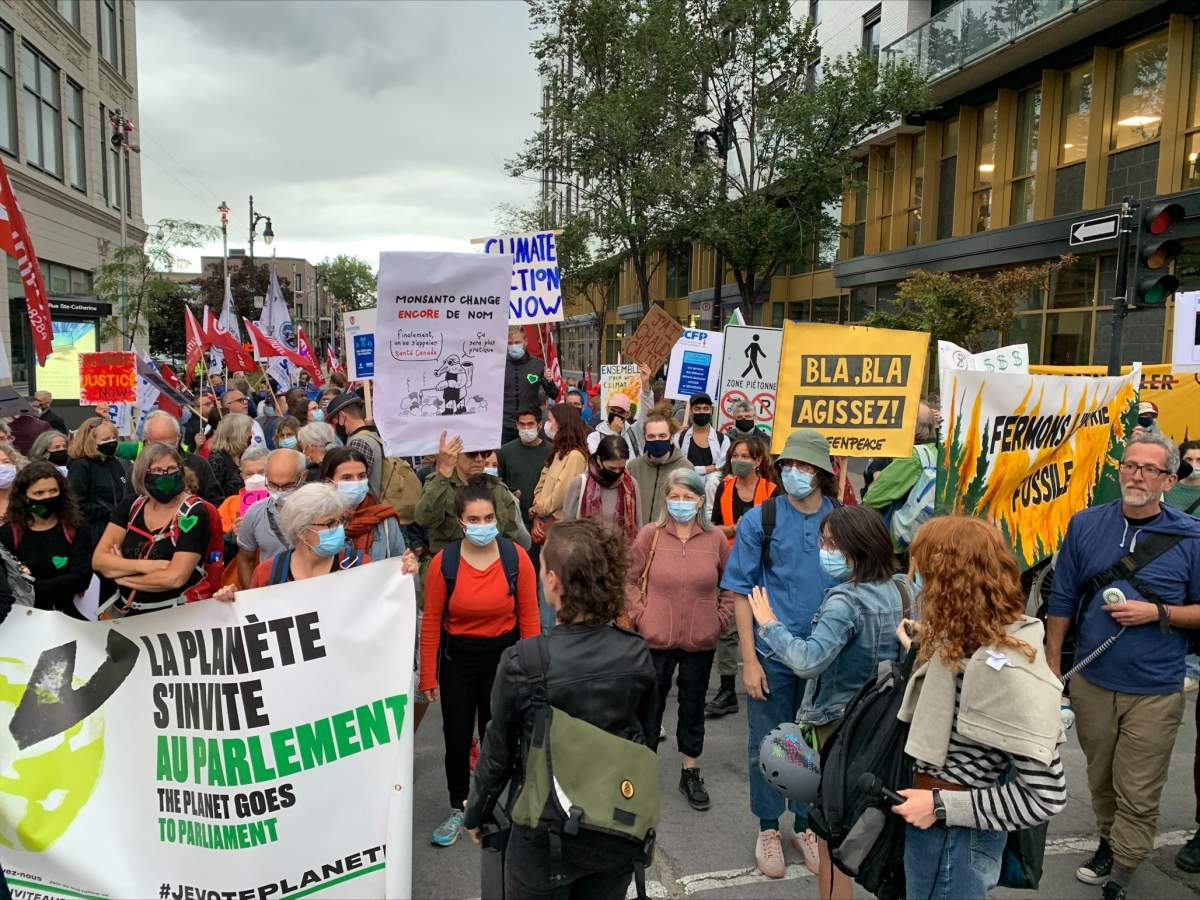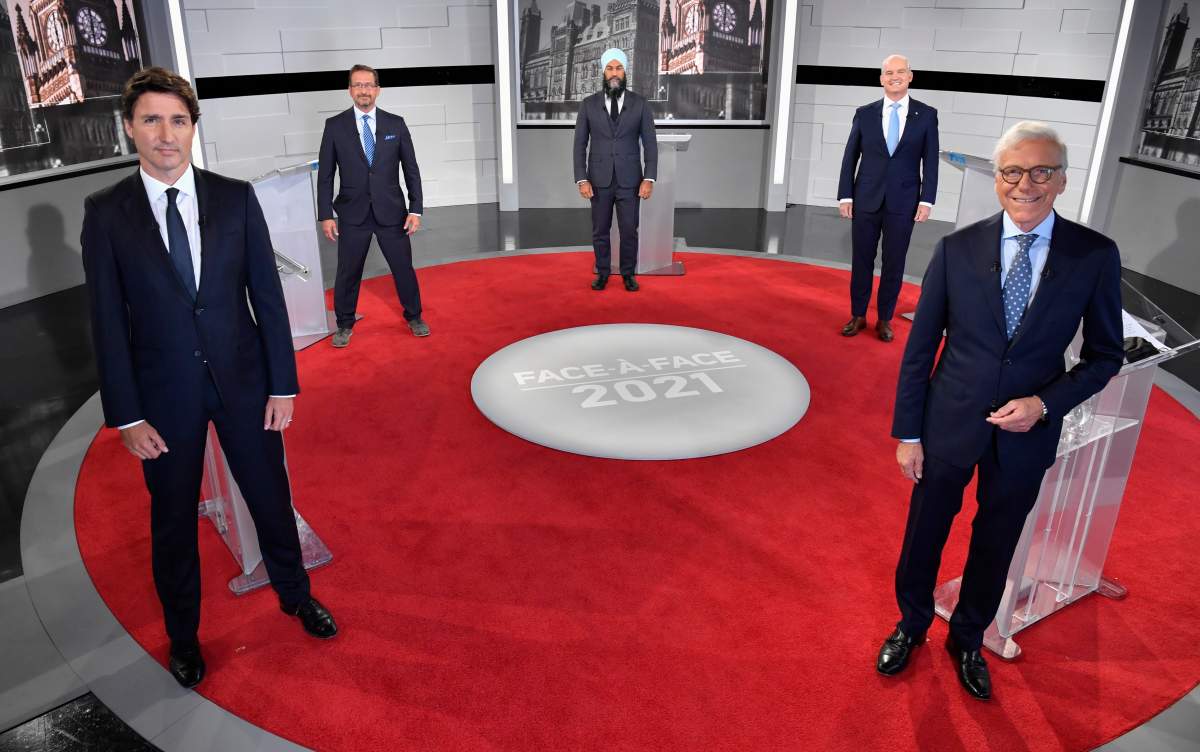Four of Canada’s party leaders squared off in French for their first televised debate in the federal election campaign, with the COVID-19 pandemic and vaccinations taking centre stage Thursday night.

New Democrat Jagmeet Singh, Conservative Erin O’Toole, Yves-François Blanchet of the Bloc Québécois and Liberal Justin Trudeau were on stage at TVA network in Montreal.
It involved a series of face-to-face encounters between two people at a time, which led to longer and fiery exchanges. The event came midway through the campaign, as leaders hope to snap up votes before the election Sept. 20.
The COVID-19 pandemic was the first topic to be discussed, with the three opposition leaders criticizing Trudeau for pushing an election as the health crisis continues. Singh called the election “useless” while O’Toole said it “wasn’t the time” to call one.

“If you were in a majority government, would we be in an election right now?” Blanchet quipped.
Trudeau replied that Canadians should have a choice in how the country is governed, adding that when he was re-elected in 2019, “no one was talking about a pandemic.” After the debate, the Liberal leader sought to clarify his choice of words after he said there would likely be another vote in 18 months if there isn’t a majority — Trudeau said he simply meant that 18 months is the average life span of a minority government.
When asked about implementing mandatory vaccinations for adults, the leaders seemed to agree they don’t want to mandate people to roll up their sleeves — with O’Toole saying it’s important to “educate but not force” Canadians.
But Trudeau said he is in favour of limiting the privileges of those who choose not to get vaccinated, while Singh said “We can make it necessary for federal workers.”
The Bloc leader often jumped in with his own questions. Turning to face them, he asked all three opponents if all their candidates are vaccinated.
Citing medical reasons, Trudeau said there is a single exception in his team. Singh has confirmed that New Democrat nominees are vaccinated, as are the Bloc candidates. O’Toole dodged the question, repeating that Conservatives use rapid tests.

Get daily National news
The leaders also sparred over health transfers, when O’Toole reiterated that his plan to boost health transfers to Quebec would be done with no strings attached. He said Trudeau’s approach to long-term care amounts to “paternalism.”
The Bloc leader took aim at Trudeau’s idea to nationalize standards for long-term care homes, criticizing him for interfering in provincial jurisdiction.

The Liberal leader also parried with jabs that O’Toole’s appreciation for provincial jurisdiction amounts to supporting a “two-tiered health system.”
All four leaders pulled up at the event on buses or vans in the two hours leading up to the debate, after making their way through a small crowd of environmental demonstrators outside the TVA building, where there was a heavy police presence.
Protesters laid on the ground after setting off red smoke canisters to symbolize wildfires and bring attention to the climate crisis.
Toward the end of the debate, when the issue of the environment came up, Trudeau defended his record on climate change. Singh and O’Toole took aim at Trudeau, saying the country missed its targets for reducing greenhouse gas emissions under the Liberals.
Secularism, the French language
The leaders are vying to charm Quebecers ahead of polls opening later this month. Singh is eyeing a comeback and O’Toole is looking to make grounds in the province, while Trudeau and Blanchet are aiming to boost their seat count.
They addressed the thorny issue of Quebec’s secularism law known as Bill 21 — which bars certain workers in the public sector from wearing religious symbols in the workplace.
Trudeau has been outspoken about the legislation, which has been the subject of legal challenges, but Quebec Premier François Legault maintains has widespread support in the province.
“Quebecers know very well I don’t agree with this law,” Trudeau said Thursday.
O’Toole, however, said that while he wouldn’t think of tabling a similar bill at the federal level, he respects the province’s decision. After the debate, Singh told reporters he respects the separation of church and state but he doesn’t believe in discriminating against people for what they wear.
When it comes to French, Trudeau underlined the importance of protecting the language in both Quebec and Canada, but O’Toole accused him of not acting quickly enough.
Singh, meanwhile, suggested francizing newcomers to ensure the language flourishes.
Blanchet, for his part, raised the issue of immigration — saying he’s not worried about the number of new arrivals in Quebec, but argued they need to be adequately integrated in French. He also stressed the place of French in commerce and the Constitution.
Debate ‘important within Quebec’
Daniel Béland, a political science professor at McGill University, explained what unfolds during the debate can alter the race in the province and outside of it.
“It’s important within Quebec since it’s very Quebec centric. It’s a Quebec network, it’s in French — so many Quebecers will be watching,” he said. “But francophones from outside the province and really political junkies who know French from outside Quebec are also likely to watch.
“This is the first debate of the campaign across the country… so I think it’s important and people outside Quebec will pay attention to what happens.”
The Green Party’s Annamie Paul and the People’s Party’s Maxime Bernier were not invited to participate in the TVA event. Paul will be at the next debates, while Bernier did not meet the Leaders’ Debates Commission criteria.
The leaders of the five major parties will participate next week in the two official debates organized by the commission.
The French-language debate will air Sept. 8 while the English debate will take place the next day.
—With files from Global News’ Miranda Anthistle, Gloria Henriquez and The Canadian Press










Comments
Want to discuss? Please read our Commenting Policy first.